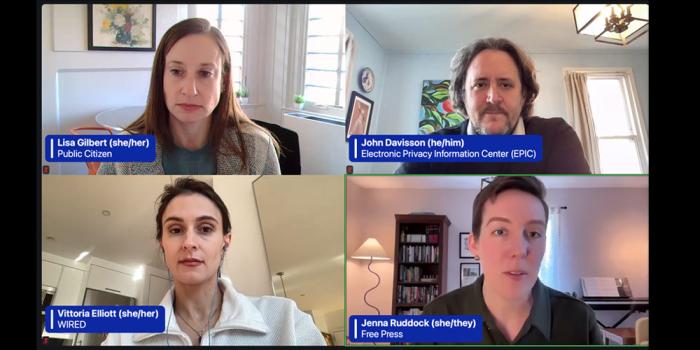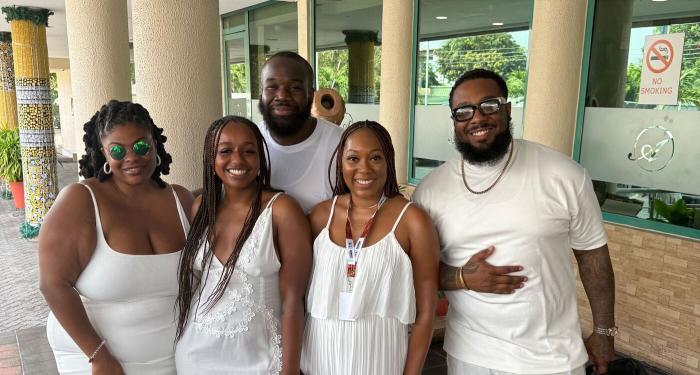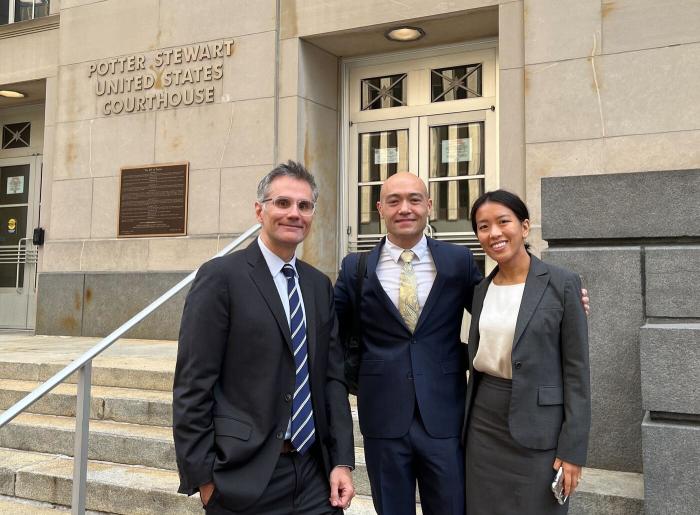Community, Power and the Future of Journalism

Journalists wield an immense amount of power.
Their role as essential information providers, community connectors and conduits for civic participation grant them a unique opportunity to help craft the narratives through which we understand, view and participate in the world.
Free Press’ News Voices project works with storytellers, reporters and newsrooms to build a reality where the power of journalism is shared with those most impacted by its reach: community members. Over the past four months, News Voices: Colorado has been working with the Community Foundation Boulder County and KGNU Community Radio on their TRENDS Reporting Fellowship to explore how power, relationship building and community trust can help build the future of journalism.
The fellowship follows a Community Foundation report that found that while Boulder is looking to improve mental-health services for residents and expand affordable housing, it needs to do more to support people of color, immigrants, refugees and senior citizens. This fellowship looks to build on this report by collaborating with storytellers throughout the county to better serve these communities.
The News Voices: Colorado project joined other innovators such as Solutions Journalism Network and a local anti-oppression group, Building Bridges, to guide 12 fellows in producing and enhancing equitable and community-centered storytelling in Boulder County.
The inaugural group of fellows in the TRENDS Reporting Fellowship represent a variety of interests, backgrounds and geographies. We had folks zooming in from different parts of the world, including community organizers, cartoonists, journalists who work in traditional newsrooms and reporters who are starting their own initiatives. Over the lifetime of the fellowship, these storytellers will create local projects that incorporate their learnings from all of the partners that host trainings.
Every third Tuesday over the course of four months, my Free Press colleague Madeleine Bair and I gathered virtually with the fellows and led two-hour workshops centered on strategies and techniques to build trusting and sustainable relationships with the communities their reporting serves.
Working toward equitable storytelling
We structured our workshops as an extended conversation about how to center community members in the journalism-making process. This approach reflected our fundamental belief that communities know their information needs best and that lived experience is a form of expertise that journalists should value.
Our conversation required that we investigate who and what we define as community, understand our own relation to power, and consider how our reporting contributes to a new future for journalism.
Using community-organizing tactics, we shared tools, examples and strategies to help the fellows build strong relationships with communities, share and redistribute power, and create a future that works for BIPOC, rural communities, Black women, differently abled people, trans folk, undocumented people and anyone who has not had full access to journalism’s power and influence.
Our first workshop explored ways to build a community map to understand how information is shared within a community and identify opportunities to improve relationships. News Voices has found that there are many formal and informal ways that communities partake in information sharing. It’s critical for journalists to build relationships within these information spheres if they want their journalism to be relevant, accessible and valuable to the communities they serve.
These maps can identify areas where the fellows’ relationships with community members need more care, intentional tending and trust-building. We used examples like Oakland’s El Tímpano — a local reporting lab that uses community-listening models to provide information relevant to the needs of the city’s Latinx community — to demonstrate how forging relationships and trust within a community can yield reporting that is more specific and relevant.
In our second training, we expanded upon this idea and provided tactics to build strong, trusting and reciprocal relationships through one-on-one interactions.
Historically, journalists have defined community members mostly in their capacity as consumers. We worked with fellows to consider that community-centered journalism requires us to understand ourselves in relation to community rather than as separate. We worked with participants to identify the characteristics in our personal lives that create trusting and long-lasting relationships and strategized about ways for reporters to replicate those features as they build connections with community members.
Following the framework of Free Press’ Media 2070 project, we also discussed how to address and acknowledge harm in communities where trust has been broken. In communities where journalism has ignored, maligned and intentionally harmed community members, the beginning of rebuilding trust starts with an acknowledgement of the material impact and consequences of previous harms and community-led approaches toward repair.
In our third training session, we explored how to understand a particular community’s information needs and brainstormed with fellows about ways to share and build power. We discussed projects that share power with communities like Germantown Info Hub, Radio Ambulante Listening Clubs and Stories of Atlantic City. We had a robust discussion about the different ways journalists hold power and have access to other people in power.
The fellows named their relation to power in quite a few ways, including: determining what stories are important, deciding whose voices to elevate and considering the power journalists hold when choosing what framework to put around a story.
Following this concept, the fellows then brainstormed ways to redistribute and share that power with those most impacted by their storytelling and surfaced ideas such as: sharing stories with sources before they go to print, building newsrooms that are more representative of their communities and recognizing someone’s lived experience as a form of expertise.
Journalism has the capacity to help create a future where equity and power-sharing are common practices. In our final installment, we talked about tactics for hosting transformative convenings, shared examples where journalists collaborated with community members and ended by asking participants to discuss their visions for the future of journalism.
One fellow, Glenda Russell, said that by 2070, she hopes that K–12 schools incorporate ways for every student to write their own narratives and flex their journalistic muscles through art, theater and music. Another fellow, Will Betke-Brunswick, made a drawing (below) that demonstrates all the different mediums through which we can share news and information. Other fellows discussed turning newsrooms into cooperatives, owned by the people.

It would seem to us that the future of journalism is already here.
News Voices: Colorado would like to thank the Community Foundation Boulder County, KGNU Community Radio, Chris Barge, Jon Walton and Timo Russo for all their vision and work in bringing together this inaugural cohort.
Want to get involved in News Voices: Colorado? Sign up here!





